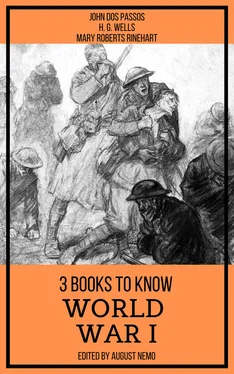“Come here,” he whispered. “Want some cheese?”
A lot of cheeses ranged on a board shone silver in the moonlight that came in through the open door.
“Hell, no, ain't fit te eat,” said Judkins, pushing his heavy fist into one of the new soft cheeses.
“Doan do that.”
“Well, ain't we saved 'em from the Huns?”
“But, hell.”
“War ain't no picnic, that's all,” said Judkins.
In the next door they found chickens roosting in a small room with straw on the floor. The chickens ruffled their feathers and made a muffled squeaking as they slept.
Suddenly there was a loud squawking and all the chickens were cackling with terror.
“Beat it,” muttered Judkins, running for the gate of the farmyard.
There were shrill cries of women in the house. A voice shrieking, “C'est les Boches, C'est les Boches,” rose above the cackling of chickens and the clamor of guinea-hens. As they ran, they heard the rasping cries of a woman in hysterics, rending the rustling autumn night.
“God damn,” said Judkins breathless, “they ain't got no right, those frogs ain't, to carry on like that.”
They ducked into the orchard again. Above the squawking of the chicken Judkins still held, swinging it by its legs, Chrisfield could hear the woman's voice shrieking. Judkins dexterously wrung the chicken's neck. Crushing the apples underfoot they strode fast through the orchard. The voice faded into the distance until it could not be heard above the sound of the guns.
“Gee, Ah'm kind o' cut up 'bout that lady,” said Chrisfield.
“Well, ain't we saved her from the Huns?”
“Andy don't think so.”
“Well, if you want to know what I think about that guy Andy I don't think much of him. I think he's yaller, that's all,” said Judkins.
“No, he ain't.”
“I heard the lootenant say so. He's a goddam yeller dawg.”
Chrisfield swore sullenly.
“Well, you juss wait 'n see. I tell you, buddy, war ain't no picnic.”
“What the hell are we goin' to do with that chicken?” said Judkins.
“You remember what happened to Eddie White?”
“Hell, we'd better leave it here.”
Judkins swung the chicken by its neck round his head and threw it as hard as he could into the bushes.
They were walking along the road between chestnut trees that led to their village. It was dark except for irregular patches of bright moonlight in the centre that lay white as milk among the indentated shadows of the leaves. All about them rose a cool scent of woods, of ripe fruits and of decaying leaves, of the ferment of the autumn countryside.
The lieutenant sat at a table in the sun, in the village street outside the company office. In front of him sparkled piles of money and daintily tinted banknotes. Beside him stood Sergeant Higgins with an air of solemnity and the second sergeant and the corporal. The men stood in line and as each came before the table he saluted with deference, received his money and walked away with a self-conscious air. A few villagers looked on from the small windows with grey frames of their rambling whitewashed houses. In the ruddy sunshine the line of men cast an irregular blue-violet shadow, like a gigantic centipede, on the yellow gravel road.
From the table by the window of the cafe of “Nos Braves Poilus” where Small and Judkins and Chrisfield had established themselves with their pay crisp in their pockets, they could see the little front garden of the house across the road, where, behind a hedge of orange marigolds, Andrews sat on the doorstep talking to an old woman hunched on a low chair in the sun just inside the door, who leant her small white head over towards his yellow one.
“There ye are,” said Judkins in a solemn tone. “He don't even go after his pay. That guy thinks he's the whole show, he does.”
Chrisfield flushed, but said nothing. “He don't do nothing all day long but talk to that ole lady,” said Small with a grin. “Guess she reminds him of his mother, or somethin'.”
“He always does go round with the frogs all he can. Looks to me like he'd rather have a drink with a frog than with an American.”
“Reckon he wants to learn their language,” said Small. “He won't never come to much in this army, that's what I'm telling yer,” said Judkins.
The little houses across the way had flushed red with the sunset. Andrews got to his feet slowly and languidly and held out his hand to the old woman. She stood up, a small tottering figure in a black silk shawl. He leaned over towards her and she kissed both his cheeks vigorously several times. He walked down the road towards the billets, with his fatigue cap in his hand, looking at the ground.
“He's got a flower behind his ear, like a cigarette,” said Judkins, with a disgusted snort.
“Well, I guess we'd better go,” said Small. “We got to be in quarters at six.”
They were silent a moment. In the distance the guns kept up a continual tomtom sound.
“Guess we'll be in that soon,” said Small.
Chrisfield felt a chill go down his spine. He moistened his lips with his tongue.
“Guess it's hell out there,” said Judkins. “War ain't no picnic.”
“Ah doan give a hoot in hell,” said Chrisfield.
The men were lined up in the village street with their packs on, waiting for the order to move. Thin wreaths of white mist still lingered in the trees and over the little garden plots. The sun had not yet risen, but ranks of clouds in the pale blue sky overhead were brilliant with crimson and gold. The men stood in an irregular line, bent over a little by the weight of their equipment, moving back and forth, stamping their feet and beating their arms together, their noses and ears red from the chill of the morning. The haze of their breath rose above their heads.
Down the misty road a drab-colored limousine appeared, running slowly. It stopped in front of the line of men. The lieutenant came hurriedly out of the house opposite, drawing on a pair of gloves. The men standing in line looked curiously at the limousine. They could see that two of the tires were flat and that the glass was broken. There were scratches on the drab paint and in the door three long jagged holes that obliterated the number. A little murmur went down the line of men. The door opened with difficulty, and a major in a light buff-colored coat stumbled out. One arm, wrapped in bloody bandages, was held in a sling made of a handkerchief. His face was white and drawn into a stiff mask with pain. The lieutenant saluted.
“For God's sake where's a repair station?” he asked in a loud shaky voice.
“There's none in this village, Major.”
“Where the hell is there one?”
“I don't know,” said the lieutenant in a humble tone.
“Why the hell don't you know? This organization's rotten, no good.... Major Stanley's just been killed. What the hell's the name of this village?”
“Thiocourt.”
“Where the hell's that?”
The chauffeur had leaned out. He had no cap and his hair was full of dust.
“You see, Lootenant, we wants to get to Chalons—”
“Yes, that's it. Chalons sur...Chalons-sur-Marne,” said the Major.
“The billeting officer has a map,” said the lieutenant, “last house to the left.”
“O let's go there quick,” said the major. He fumbled with the fastening of the door.
The lieutenant opened it for him.
As he opened the door, the men nearest had a glimpse of the interior of the car. On the far side was a long object huddled in blankets, propped up on the seat.
Before he got in the major leaned over and pulled a woollen rug out, holding it away from him with his one good arm. The car moved off slowly, and all down the village street the men, lined up waiting for orders, stared curiously at the three jagged holes in the door.
Читать дальше












